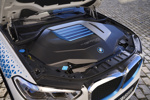THE Government has announced a 'major' deregulation of company van taxation.
Under the current rules, the benefit charge payable for a van available to an employee for private use is £500 (or £350 for a van that is four or more years old at the end of the tax year), a law that has been in place and unchanged since 1993. The charge also includes any private fuel provided.
The change announced today sees scale charges based on the type of private use introduced with a new charge for employer provided fuel.
From April 6, 2005 employees who have to take their van home and are not allowed other private use will not have to pay a benefit tax charge.
Where private use is unrestricted the existing £500 or £350 scale charge will apply dependent upon the age of the van.
However, from April 6, 2007 the discount for older vans will be removed and the scale charge for unrestricted private use will increase to £3,000 and if an employer provides fuel for unrestricted private use an additional fuel charge of £500 will also apply.
Self-employed van drivers are not affected by these new rules.
Company car tax
COMPANY car drivers are facing 10% increases in their tax bills in the next financial year - but it should come as no surprise.
Under the current carbon dioxide-based company car tax system, every year the emissions standards on which the tax is based has become more strict since it was introduced in the 2003/04 tax year.
For the 2004/05 tax year, vehicles will need to produce 149g/km or less of carbon dioxide to qualify for the minimum 15% tax band, compared to 155g/km for 2003/04.
Today the Chancellor announced that the level of CO2 emissions qualifying for the minimum percentage charge for a petrol car (15%) will be frozen at 140 grams per kilometre for 2006/07.
The fuel benefit tax charge applies the same percentage as the company car charge against a set figure. The 2003/04 figure of £14,400 will be frozen for 2004/05.
Company car drivers pay tax at their basic rate on a percentage of the P11d value of their car, which is defined according to the level of emissions their cars produce.
So a driver in a car producing 180g/km who would have tax on 20% of the car's P11d price for 2003/2004 will pay tax on 22% of the car's P11d price for 2004/2005 – a 10% tax hike.
For many drivers, this could mean their company car tax bill rising by £200 next year.
But, under an agreement with the fleet industry, the Government published the tax rates for 2004/2005 more than two years ago, to help fleets prepare long-term strategies for company cars.
Therefore, fleet managers should have been aware of the plans and consequently informed their drivers of their tax bill for several years in advance, before the driver signed up to a particular company car.
Several years ago, the Government published the tax rates for company cars for 2005/2006 as well, which will introduce a further hike when the minimum tax level of 15% is only available to cars producing 144g/km of CO2 or less.
However, fleet managers can ensure drivers avoid any tax rises by choosing low emission company cars, particularly diesels, which already meet the lowest emission standards for future years of the company car tax regime.
Additional note: The Government's ongoing evaluation of the new emissions-based system has found that in 2003 around 0.15 to 0.2 million tonnes of carbon were saved through reduced CO2 emissions. Company cars travelled an estimated 300 – 400 million business miles less in 2003. After one-off costs to implement the changes to the tax calculations, the Government says, employers are saving around £35 million each year in compliance costs as they do not have to keep records of business mileage.
A report of the initial evaluation findings will be published by the Inland Revenue shortly.
| Sample company car tax increases | ||||||||||
|---|---|---|---|---|---|---|---|---|---|---|
| 2003/2004 | 2003/2004 | |||||||||
| P11D | CO2 | BIK% | Tax bill | BIK% | Tax bill | Rise | ||||
| Ford Mondeo 1.8LX 5dr | £14,907 | 187 | 21 | £3,130 | 23 | £3,428 | 9.5% | |||
| Vauxhall Vectra 2.2 auto | £17,127 | 226 | 29 | £4,966 | 31 | £5,309 | 6.9% | |||
| BMW 320d EIV | £22,327 | 153 | 15 | £3,349 | 16 | £3,572 | 6.6% | |||
| Citroen C3 1.4LX | £9,552 | 148 | 15 | £1,432 | 15 | £1,432 | 0% | |||
| BIK from April 2004 | ||||||||||
|---|---|---|---|---|---|---|---|---|---|---|
| P11D % to be taxed | CO2 (g/km) | CO2 (g/km) | CO2 (g/km) | |||||||
| 2003/04 | 2004/05 | 2005/06 | ||||||||
| 15* | 155 | 145 | 140 | |||||||
| 16* | 160 | 150 | 145 | |||||||
| 17* | 165 | 155 | 150 | |||||||
| 18* | 170 | 160 | 155 | |||||||
| 19* | 175 | 165 | 160 | 20* | 180 | 170 | 165 | |||
| 21* | 185 | 175 | 170 | |||||||
| 22* | 190 | 180 | 175 | |||||||
| 23* | 195 | 185 | 180 | |||||||
| 24* | 200 | 190 | 185 | |||||||
| 25* | 205 | 195 | 190 | |||||||
| 26* | 210 | 200 | 195 | |||||||
| 27* | 215 | 205 | 200 | |||||||
| 28* | 220 | 210 | 205 | |||||||
| 29* | 225 | 215 | 210 | |||||||
| 30* | 230 | 220 | 215 | |||||||
| 31* | 235 | 225 | 220 | |||||||
| 32* | 240 | 230 | 225 | |||||||
| 33** | 245 | 235 | 230 | |||||||
| 34*** | 250 | 240 | 235 | |||||||
| 35**** | 255 | 245 | 240 | |||||||
** adds 2% if car runs solely on diesel
*** add 1% if car runs solely on diesel
**** maximum charge so no diesel supplement
Fuel duty
DUTY rates for sulphur-free fuels will be increased in line with inflation from September 1, 2004, with the duty for ultra-low sulphur fuels set at 0.5 pence per litre above this level from the same date.
The rate of duty for liquified petroleum gas has risen from 9 pence per kg (equivalent to 5.4p per litre) to 13.03 per kg (equivalent to 7.82p per litre), a rise of 2.1p per kg or 1.42p per litre.
Natural gas used as a road fuel has risen from 9p per kg to 11.1p per kg (or 7.52p per litre), a rise of 2.10 per kg (or 1.42 per litre).
##Fuelduty04--none##
The Chancellor promised three-years of certainty on the tax treatment of alternative fuels by:
Biofuels
HM Customs and Excise will be consulting on the use of input-based taxation for biofuels in summer 2004.
The Department for Transport will be publishing the Biofuels Directive consultation paper shortly after the Budget, which will include options on complementary regulatory measures, including a Biofuels Obligation for the transport sector.
Vehicle excise duty
The Chancellor announced a freeze on VED rates.
Emergency service vehicles
Emergency service workers, such as fire and ambulance personnel, who are required to take their vehicles home at night so they can respond quickly to emergencies will now no longer have to pay tax and National Insurance on this 'operational requirement'.















Login to comment
Comments
No comments have been made yet.